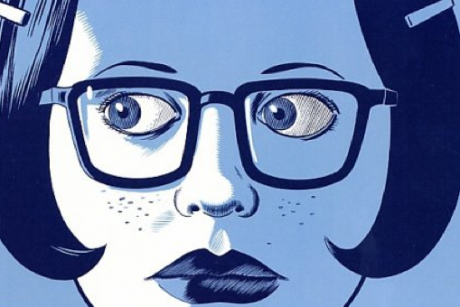Caro’s been busy with real life things, so hasn’t been about here much. We miss her though, so I thought I’d reprint this comment about Ghost World. I think it’s from about the first thread she ever commented on.
So I got home and read Ghost World through again, looking specifically for three things: disaffection –> emotional maturation/emotional resonance, the gaze of the adult male, and the unreliable Nabokovian narrator. (Google sends me to Comics Comics quoting Clowes referencing the latter in TCJ #233 in relation to David Boring so we do have evidence that he knows the phenomenon.)
A lot of people here have pointed out that dynamic between disaffection and really tumultuous emotional moments as what makes the book resonant for them. My recollection of Enid had been “archetypal disaffected grumpy teen.” I actually didn’t get that much at all this time, and I think it’s the way the conversation here has underlined the distinction between Barthian disaffection – which is really a kind of psychic paralysis that bears only a metaphorical relationship to “real” experience – and pop-cultural ironic distance, which is a pretty common subject position. I admit the latter is there, but it didn’t feel “disaffected” in that light. It’s more a cultivated disconnection –“this thing that matters to them? It so does not matter to me,” – and it felt entirely self-protective rather than truly detached. She didn’t feel like she was “searching for an identity” and coming up “nowhere.” She felt like she was fearing adulthood and coming up adult anyway.
I was looking for unreliability, and suddenly it was everywhere: is she really detached, or is she just pretending to be? Did that thing really even happen or is she just making it up? Her stories were always obviously, well, embellished, but this time, looking specifically for places where her narrative might be unreliable, suddenly they felt even more fictional. The trick seems to be that if it happens in dialogue with Becky, we’re probably supposed to think it happened. If Enid tells it, maybe it did, maybe it didn’t. The images give us clues what to hang onto and what to read as hyperbole … from there, Enid’s propensity to exaggerate and overdramatize seemed to be the thing she outgrows over the course of the story, not her ironic detachment or disaffection. She stopped protecting herself with stories, hanging on to the way when you’re a child you can fabricate imaginary events, escape into your imagination in a way that you can’t do as an adult.
But maybe it’s more unreliable than that. Maybe the scenes with Becky really aren’t the tell: Melorra by all conventions SHOULD be lying (“I’m in a commercial”, OMG Carrie’s face) but both are backed up by my previous logic, so maybe instead that Lynchian grotesque moment when you see the tumor actually is the moment where you’re supposed to say “oh, wow, all that stuff is unreliable.” Maybe there’s a level of unreality that we’re not even touching on.
Either works to some extent, and both are kind of fun, – but is not being sure whether the narrative is true or imagined really what it means to have an “unreliable narrator”? I guess it is, in a simple sense. But it’s more than a puzzle in the best literary fiction that uses the device: it’s a veil that can’t really be lifted to ever determine what’s true and what’s not . The unreliability stays in play and becomes a metaphor, often, for fiction itself, for how narrative and belief get tied together with merely some typographical characters on a page. Here it could become a metaphor for how narrative and belief get tied together with typography and image, but instead it’s really just a metaphor for adolescence itself. Whether or not Enid’s telling the truth about ANYTHING, the issue resolves when she grows up. You still end up with this basically sweet story about letting go of childhood (bracketing Noah’s reading for now), and the only real difference is at the level of close reading and whether Mark thinks I am making things up. (Pfft.) The jury’s still out on whether unreliability becomes a metaphor for the work that comics do in David Boring: it seems intuitively on tonight’s first ever quick read-through of that like it might.

